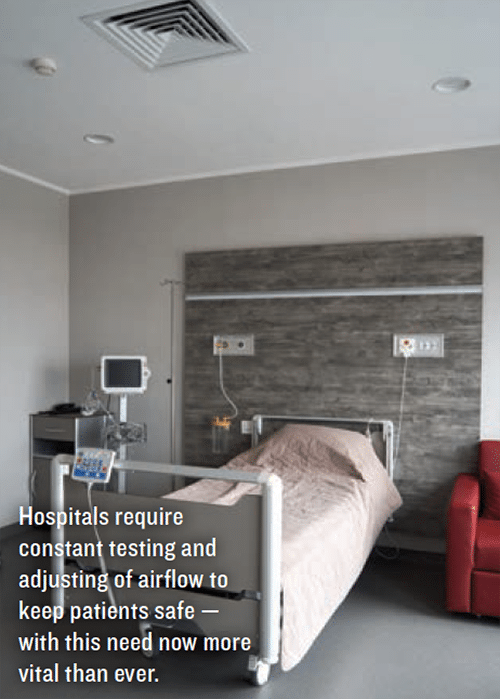The International Training Institute (ITI) recently received a $3.4 million grant to build two testing, adjusting and balancing (TAB) labs at training centers for SMART Local 85 in Atlanta and Local 88 in Las Vegas.
Funded by the United States Department of Energy’s Office of Manufacturing and Energy Supply Chains (MESC), this grant establishes the ITI as a new Industrial Training and Assessment Center (ITAC). With funds from the Bipartisan Infrastructure Law, the ITAC program supports educational institutions to provide energy efficiency, clean energy, and health and safety job training to participants, simultaneously helping improve industrial sector efficiency and productivity.
A large portion of the grant will be spent the first year, building the two labs. The last two years of the grant will allow the ITI to conduct training in TAB, ventilation verification and indoor air quality, heat pump technology, and other courses that involve energy efficiency and the installation of those systems and equipment. There will be 12 classes hosted by the ITI in each location over each of the two years, said Mike Harris, ITI administrator.
“Ultimately, the goal for us was to build these two labs to expand our workforce in these areas and utilize these facilities to do training for members — one on the East Coast and one on the West Coast,” he said. The grant began April 1 and gives the ITI one year to build the labs, which Harris doesn’t expect to take that long. “If we complete them early, we may be able to move into the next part of the grant, the training, early.”
Local 85 in Atlanta recently purchased a new building for its training center, essentially providing a blank slate to create an 8,000-square-foot lab. Local 88 in Las Vegas is currently undergoing a renovation and expansion project to their facility and will finally get a dedicated TAB lab after years hosting the training across the parking lot in the back of the union hall building, Harris said.
“I think they’ll be two unique labs that will both be excellent sites to host our training,” he added. “While they will be a little different depending on what each needs to make the lab fit the space and the contractors in that area, we will be able to facilitate the same top-rate training classes at both.”
Both labs will feature the newest technology and equipment, and they will allow instructors to create real-life scenarios for students to problem solve. At Local 85, a clean room will be set up to allow fume hood, HEPA filter and dedicated outdoor air system (DOAS) training as well as fire/smoke damper and stairwell pressurization.
Las Vegas’ Local 88 will have an approximately 5,000-square-foot lab, equipped with a pressure independent variable air volume (VAV) system with direct digital and pneumatic controls; a constant-volume, multi-zoned air handler; two types of water piping system training boards; chilled water system; three-circuit hot water system; and digital controls training stations. In addition, a three-compartment room-to-room pressurization structure for fire life safety stair and compartmental pressure setups is planned, along with a hospital critical room pressure setup, commercial kitchen exhaust hood system, laboratory fume hood system and a clean room training structure.
Alan Still, training director at Local 85, has been waiting for a TAB lab his entire 21-year career as head of the apprenticeship program.
“We’ve been teaching TAB for 10 years without a lab. We’ve had a lot of makeshift stuff we’ve had to put together,” he said. “It’s finally a dream come true. Through the partnership with the ITI, we are able to get the best of the best, state-of-the-art lab with everything an apprentice would ever see on a job. It’s a great opportunity. It better equips them to be out in the field. It’ll increase our work hours as far as giving them that real-world experience.”
Currently, the closest certified TAB lab for Local 85 members to test for certification is in Philadelphia, Still said. Not only will the new lab allow members to test and receive certifications in house, it gives them the opportunity to expand to other certifications, such as fire life safety, they could not provide before.
“We will be able to host fire inspectors, fire marshals. We can show them what happens when the fire dampers work and when they don’t work,” Still said. “I could have never dreamed what we were going to have, and it would not have been possible had it not been for this grant.”
Ken Bosket, TAB specialist and full-time instructor at Local 88, echoed that sentiment.
“It’s going to bring us up to par to what is actually out in the field when our technicians go out there to work. We are outdated with our current TAB lab,” he said. “That’s one of the main reasons I’m excited — we’re going to have more equipment to work with, more real-world scenarios to run.”
With new equipment and updated technology, Bosket hopes the TAB lab brings in sheet metal journeypersons who want to expand their skills in addition to current apprentices.
“TAB is not as easy as everyone thinks. We run into potential road blocks in our field all the time. Understanding how equipment and systems operate helps immensely in solving problems,” Bosket said. “We help find solutions and steer the proper functioning of not just merely HVAC equipment, but on a much broader scale. We’re talking water flow, air flow, electrical systems, building automated controls, building environmental or indoor air quality conditions, fire life safety systems. Understanding TAB is a precious asset.”
The locals were chosen based on need in the area, contractor demand and the ability to train not only members from around the country but also the apprentices and journey-persons in those local memberships.
“There’s a big need for it, and it’s going to help them start expanding that workforce or that knowledge to their workforce,” Harris said.
